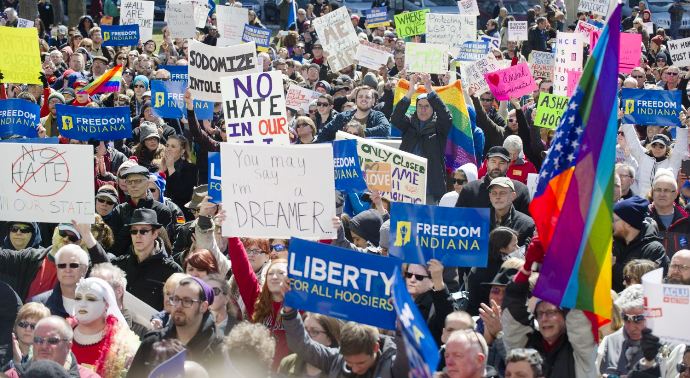Prejudice has a cunning way of working itself into the smallest of crevices and then gradually expanding.

The latest political firestorm surrounds Indiana Governor Mike Pence who last Thursday, signed into law what he and others in the state’s legislature labeled “religious freedom.” No sooner had the governor made his announcement then an avalanche of protests began regarding the fact that the new bill could be used by businesses to refuse service to gay individuals. On the Sunday talk shows, Pence vehemently defended the bill claiming that both the media and protesters had overblown the issue.
However, The Associated Press reported (Mar. 26), that “At least two groups — the Christian Church (Disciples of Christ) and Gen Con, a gaming convention — have said they would reconsider plans to hold their meetings in Indianapolis because of the legislation.”
Mother Jones reported that (Mar. 31), “Salesforce chief executive Marc Benioff tweeted on Thursday that the tech giant was canceling programs that would require customers or employees to travel to Indiana. The San Francisco-based company bought the Indianapolis-based ExactTarget for $2.5 billion last year. Angie’s List is putting a campus expansion project in Indianapolis on hold, while Yelp’s chief executive Jeremy Stoppelman said it would be ‘unconscionable’ for the company to maintain or expand “a significant business presence in any state that encouraged discrimination.” Apple’s chief executive Tim Cook wrote an op-ed for the Washington Post opposing the legislation, saying that it ‘rationalize[s] injustice by pretending to defend something many of us hold dear.’ The chief executives of Gap and Levi’s have also since spoken out against the law in a joint statement.”
Even Indiana’s own newspaper, The Indianapolis Star (Mar. 31), ran a headline with three words: “FIX THIS NOW,” adding, “Our image… our reputation… is at risk because of a new law, the Religious Freedom Restoration Act, that no matter its original intent already has done enormous harm to our state and potentially our economic future.
“On Monday,” Mother Jones writes, “Connecticut became the first state to join the boycott, with Gov. Dan Malloy signing an executive order prohibiting the use of state funds for travel to Indiana. Washington state soon followed, with Gov. Jay Inslee banning administrative trips there. San Francisco, Seattle, and Portland have made similar pledges, while Indianapolis Mayor Greg Ballard has called on Indiana’s general assembly to repeal the law or add protections for sexual orientation and gender identity.”
To his credit, Pence quickly saw the burning bush ($) and has since walked-backed his original statement, calling for new legislation to be on his desk by today.
Meanwhile, no sooner had Indiana announced its new bill then Arkansas Governor Asa Hutchinson announced that a similar piece of legislation was headed to his desk, and guess what happened?
Wal-Mart CEO C. Douglas McMillon took to social media, saying that the bill “threatens to undermine the spirit of inclusion present throughout the state of Arkansas and does not reflect the values we proudly uphold.”
“Facing a backlash from businesses and gay rights advocates… Hutchinson… called on state lawmakers to either recall or amend legislation billed as a religious freedom measure so that it mirrored a federal law approved in 1993. Mr. Hutchinson, a Republican, said he understood the divide in Arkansas and across the nation over the question of same-sex marriage and its impact on people’s religious beliefs.”
So, is this really about religious freedom or is it thinly disguised discrimination?
New York Times columnist Charles Blow (Apr. 1), points out that while Governor Pence believes the law to be a “perception problem,” “one Indiana pizzeria, asserting that it is ‘a Christian establishment,’ has already said that it will not cater gay weddings: ‘If a gay couple came in and wanted us to provide pizzas for their wedding, we would have to say no.’ ”
Perception just became reality, governor.
“Where are the lines between religious rights, business rights and human rights?” Blow asks. “I would argue that when you enter the sphere of commerce in America — regardless of your ‘deeply held religious beliefs’ — you have entered a nondiscriminatory zone in which your personal beliefs are checked at the register, and each customer is treated equally.
“This is not to say that a gay couple on the eve of commitment should want to patronize a bigoted baker for a wedding cake, but rather that the refusal to render services based on that bigotry is untenable.”
In the 1930s, religious intolerance came in the form of Charles Coughlin, a Catholic priest with a following of millions who avidly listened to his weekly radio broadcasts. According to biographer Donald Warren (Radio Priest, 1996), Coughlin was perfectly suited to the times. “Angry media personalities [such as Coughlin], practice an electronic demagoguery by projecting qualities of populist sincerity and trustworthiness while providing a forum for violence-provoking political expressions.”
While protestors in Indiana and Arkansas have yet to demonstrate violence, they clearly see the law for what it is: a brazen attempt to allow business owners to discriminate under the guise of religious freedom.
“We must become bigger than we have been,” Ethiopian statesman Haile Selassie said, “more courageous, greater in spirit, larger in outlook. We must become members of a new race, overcoming petty prejudice, owing our ultimate allegiance not to nations but to our fellow men within the human community.”
Amen.
Coming Monday: the U.S Supreme Court responds to my request.
Comments










